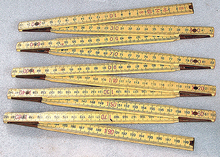Zigzag

A zigzag is a pattern made up of small corners at variable angles, though constant within the zigzag, tracing a path between two parallel lines; it can be described as both jagged and fairly regular.
In geometry, this pattern is described as a skew apeirogon. From the point of view of symmetry, a regular zigzag can be generated from a simple motif like a line segment by repeated application of a glide reflection.
Although the origin of the word is unclear, its first printed appearances were in French-language books and ephemera of the late 17th century.[1]
Examples of zigzags



- The trace of a triangle wave or a sawtooth wave is a zigzag.
- Pinking shears are designed to cut cloth or paper with a zigzag edge, to lessen fraying.[2]
- In sewing, a zigzag stitch is a machine stitch in a zigzag pattern.[3]
- The zigzag arch is an architectural embellishment used in Islamic, Byzantine, Norman and Romanesque architecture.[4][5]
- In seismology, earthquakes recorded in a "zigzag line" form by using seismograph.[6]
See also
References
- ^ Liberman, Anatoly (2009). Word Origins...And How We Know Them: Etymology for Everyone. Oxford University Press, USA. ISBN 978-0-19-538707-0.
- ^ Shepler, Missy; Brent, Rebecca (2011). The Complete Idiot's Guide to Sewing. Penguin. p. 84. ISBN 978-1-101-51368-2.
- ^ Gardiner, Wendy; Knight, Lorna (2011). The Sewing Machine Accessory Bible: Get the Most Out of Your Machine---From Using Basic Feet to Mastering Specialty Feet. Macmillan. pp. 34–35. ISBN 978-0-312-67658-2.
- ^ Allen, Terry (1986). "4". A Classical Revival in Islamic Architecture. Wiesbaden.
{{cite book}}: CS1 maint: location missing publisher (link) - ^ Allen, Terry (2008). Pisa and the Dome of the Rock (electronic publication) (2nd ed.). Occidental, California: Solipsist Press. ISBN 978-0-944940-08-2. Retrieved January 28, 2012.
- ^ "Seismograph - What is a seismograph?". SMS-Tsunami-Warning.com. Retrieved 8 January 2023.
Bibliography
- Wedgwood, Hensleigh (1855). "On Roots mutually connected by reference to the term Zig-zag". Transactions of the Philological Society (2).
